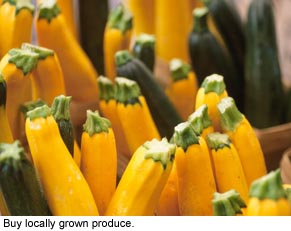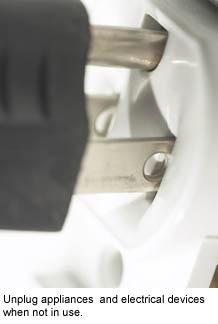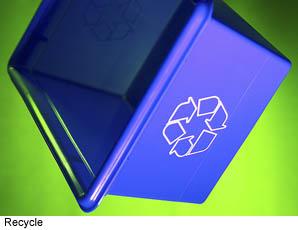Little Effort Goes a Long Way toward Living Green
Little Effort Goes a Long Way toward Living Green

It’s easy to say you want to live a more environmentally friendly lifestyle, but what about putting those words into action? Is it easy bein’ green?
Absolutely, says Amanda Gumbert, associate for agriculture and natural resource issues at the University of Kentucky Cooperative Extension Service. “There are many, many things that can be done with minimal effort.”
What’s more, even the smallest of actions will “add up over time” to make a major impact on the environment, she said. “It kind of goes along with the saying, ‘Many hands make light work.’ If everybody does a little something, it’s a cumulative effect.”
Recently, Gumbert put together a list of those little somethings – easy and mostly inexpensive ways for Kentuckians to live so-called greener lives in 2007 and beyond. That list includes:
Buy frequently used items in bulk. Buying in bulk reduces packaging, which in turn reduces garbage that ends up in a landfill. Instead of buying two 12-ounce bottles of shampoo, for instance, buy one large 24-ounce bottle. “If you’re going to use it anyway, that’s one package instead of two that you’ll have to dispose of,” Gumbert said. Plus, buying in bulk has an added bonus: It reduces trips to the store.
Buy locally produced foods. Buying locally grown fruits and vegetables, locally produced meat products and local value-added products is a winning strategy in many ways. Not only does it cut down on highly processed, heavily packaged foods, which benefits Mother Earth, it is a healthy way to eat and helps fuel the agricultural economy. While it still may be more convenient to run into the nearest 24-hour grocery store, it is getting easier to buy locally produced foods. “With agricultural diversification, you’ve got so many more options now,” Gumbert said. In addition, more grocery stores have heard consumers’ demands for fresh produce and are stocking their shelves with more locally grown items.
Borrow or rent items instead of purchasing them. This tip is most applicable to items that will not be used more than once or twice, Gumbert said. If you’re traveling to the beach this summer, for example, borrow a set of beach chairs. If you’re doing a home improvement project that requires a special tool, rent it from a hardware or rental store. “If you’re not going to use it often, then it’s better to borrow or rent the item instead of letting it sit in your house and eventually end up in the landfill,” she added.
Compost food scraps. Instead of scraping food off your plate and into the trash, try combining food scraps and paper shreds to make a compost pile in your backyard. Composting is easy and it not only reduces waste that ends up in the landfill, it provides an earth-friendly way to fertilize and condition your garden. There are even ways to compost indoors during the winter, Gumbert said.
 Unplug your appliances and electrical devices when not in use. This includes televisions, DVD players, microwaves, computers and cell phone chargers – all of which, when plugged in, can drain electricity even if they’re not in use.
Unplug your appliances and electrical devices when not in use. This includes televisions, DVD players, microwaves, computers and cell phone chargers – all of which, when plugged in, can drain electricity even if they’re not in use.
Take reusable shopping bags to the supermarket. Because more people are taking reusable shopping bags when they go to the supermarket, more checkout clerks and baggers are becoming accustomed to the practice. That means it should be easier than in the past to say “no” to plastic bags and say “yes” to bagging your groceries in a more environmentally friendly manner.
Pledge to drive less. Make 2007 the year you drive less and walk, bicycle, carpool or take public transportation more. To give yourself a little “stick-to-it-ive-ness,” set a goal – one day a week, for example – to make a conscious effort to cut down on the amount you drive and, therefore, the amount of carbon you emit, Gumbert suggested.
Install compact fluorescent light bulbs. Compact fluorescent light bulbs, when compared to conventional light bulbs, use at least two-thirds less energy and last up to 10 times longer, reducing the demand on energy systems. CFLs are more expensive to buy than conventional bulbs, but they make up for their high initial cost with their long life and high energy efficiency, Gumbert said. Cut down on water consumption. According to Gumbert, you can make a big difference in the amount of water you consume with little effort. Not letting the water run when you brush your teeth or shave and running your dishwasher and washing machine only when they are full are just two examples of simple water-saving actions. Installing low-flow showerheads and low-flow toilets can also make a huge difference, but they do have up-front costs to consider.
Cut down on water consumption. According to Gumbert, you can make a big difference in the amount of water you consume with little effort. Not letting the water run when you brush your teeth or shave and running your dishwasher and washing machine only when they are full are just two examples of simple water-saving actions. Installing low-flow showerheads and low-flow toilets can also make a huge difference, but they do have up-front costs to consider.
And there’s always the old standby of putting a water-filled milk jug in your toilet tank to reduce the amount of water required for each flush. Just check to make sure the milk jug doesn’t interfere with the tank’s mechanisms. Recycle. When your efforts to reduce and reuse are exhausted, recycle. “When all else fails, the least you can do is recycle,” Gumbert said. Most communities in Kentucky have a local or regional recycling program for paper, bottles, plastics and other common recyclables. She suggested calling the county’s solid waste coordinator to find out about a recycling program near you.
Recycle. When your efforts to reduce and reuse are exhausted, recycle. “When all else fails, the least you can do is recycle,” Gumbert said. Most communities in Kentucky have a local or regional recycling program for paper, bottles, plastics and other common recyclables. She suggested calling the county’s solid waste coordinator to find out about a recycling program near you.
To find out more about any of these earth-friendly tips or other ways to do your part for the environment, contact your county Extension office.